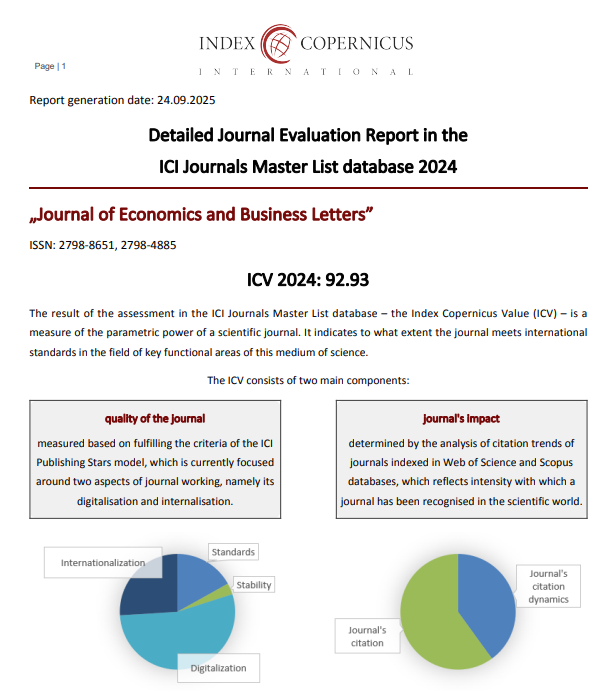Economic diplomacy and conflict resolution: Harnessing the economic peace leverage theory in the Palestine-Israel context
DOI:
https://doi.org/10.55942/jebl.v3i5.249Keywords:
Palestine-Israel conflict, Economic Peace Leverage Theory, Boycott, Divestment, SanctionsAbstract
The Palestine-Israel conflict, commencing on October 7th, has led to significant human and economic repercussions, with Palestine facing dire economic challenges exacerbated by multiple factors, and Israel experiencing disruptions in sectors such as construction. The paper delves into the Economic Peace Leverage Theory (EPLT), positing that economic tools can foster peace and reduce conflicts. The global Boycott, Divestment, and Sanctions (BDS) movement, aiming to influence Israel's policies towards Palestinians, aligns with EPLT's principles, drawing from historical instances like the South African anti-apartheid struggle. Despite Israel's resilient economy, BDS holds symbolic significance, influencing global narratives. The paper emphasizes that the real impact of BDS lies more in its perceptual influence than economic setbacks for Israel. To harness EPLT's potential and address the root concerns of the BDS movement, a collective global effort is vital. Such collaboration can pave the way for sustained peace and prosperity in the region.
References
Al Mayadeen. (2023, November 2). Israeli companies see sharp revenue decline amid aggression on Gaza. Al Mayadeen English. https://english.almayadeen.net/news/Economy/israeli-companies-see-sharp-revenue-decline-amid-aggression
Alissa, S. (2007). The economics of an independent Palestine. Where Now for Palestine? The Demise of the Two-State Solution, 123–143.
Aljazeera. (2023, October 26). Two more resolutions to halt Israel-Gaza war fail at UN Security Council | Palestine-Israel conflict News | Al Jazeera. https://www.aljazeera.com/news/2023/10/26/two-more-resolutions-to-end-gaza-violence-fail-at-un-security-council
Atkins, M. B., & Elman, M. F. (2021). BDS as a Threat to Academic Freedom and Campus Free Speech in the United States. Mich. St. Int’l L. Rev., 29, 213.
Baig, M. (2022). Breaking apart the call for boycott, divestment, and sanctions (BDS): Dispossession and displacement as two faces of settler colonialism. McGill University (Canada).
Blumenfeld, J. (2022). South Africa in crisis (Vol. 1). Taylor & Francis.
Bueckert, M. (2020). Boycotts and Backlash: Canadian Opposition to Boycott, Divestment, and Sanctions (BDS) Movements from South Africa to Israel.
Gadzo, M., Pietromarchi, V., & Mohamed, E. (2023, November 3). Israel-Hamas war live: Gaza City a ‘ghost town’ as battles rage all around. Aljazeera. https://www.aljazeera.com/news/liveblog/2023/11/3/israel-hamas-war-live-israeli-forces-gather-outside-gaza-city
Maggor, E. (2020). Politics of innovation: The entrepreneurial state and the making of Israel’s ‘start-up nation.’
Malkawi, B. H. (2009). Palestinian economic (under) development: The hurdles. The International Journal of Human Rights, 13(4), 530–543.
Mangunda, L. (2019). Israel and the BDS Movement in the Context of Securitization Theory.
Manos, R., & Gidron, B. (2021). The New Social Economy in Israel: From the Kibbutz Ideal to Social-Tech Entrepreneurship. In The New Social and Impact Economy: An International Perspective (pp. 95–118). Springer.
Marzin, J., Uwaidat, A., & Sourisseau, J.-M. (2019). Study on small-scale agriculture in the Palestinian territories.
Riecke, D. (2021). Young Adult Engagement in the Israeli-Palestinian Conflict: Sustaining Efforts of Young American Christians in Advocacy and Peacemaking.
Rogala-Lewicki, A. (2022). POLAND IN RANKINGS–THE POSITION OF THE COUNTRY IN A COMPARATIVE EVALUATION ON THE BASIS OF SELECTED INTERNATIONAL INDICATORS. Akademii Nauk Stosowanych Gospodarki Krajowej w Kutnie, 151.
Shikaki, I. (2021). The Political Economy of Dependency and Class Formation in the Occupied Palestinian Territories Since 1967. In Political economy of Palestine: Critical, interdisciplinary, and decolonial perspectives (pp. 49–80). Springer.
Tanous, O., & Eghbariah, R. (2022). Organized violence and organized abandonment beyond the human: The case of brucellosis among Palestinians in Israel. Msystems, 7(3), e01499-21.
Wrobel, S. (2023, October 30). Warning of crisis, 300 economists urge government to reallocate nonessential spending. https://www.timesofisrael.com/warning-of-crisis-300-economists-urge-government-to-halt-non-war-spending/
Downloads
Published
How to Cite
Issue
Section
License
Copyright (c) 2023 Journal of Economics and Business Letters

This work is licensed under a Creative Commons Attribution 4.0 International License.
















